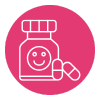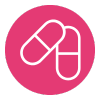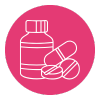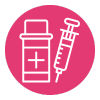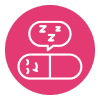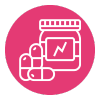
Written by:

Medically Reviewed by:
Last Updated:
January 22nd, 2025
Prescription drug rehab
Prescription drug rehab is a transformative process that has helped millions of people around the world. It provides the resources and ongoing support that are needed to overcome unhealthy relationships with prescribed drugs and reclaim your life. At Banbury Lodge rehab centre, we offer comprehensive prescription drug rehab programmes that are designed to help you achieve lasting recovery and have a brand new start in life.
What is prescription drug rehab?
Prescription drug rehab is a specialised treatment that helps those struggling with prescription drug addiction achieve recovery. The goal of prescription drug rehab is to provide a safe, supportive environment where you can overcome the condition and address its underlying issues. This will enable you to prevent future relapse and develop better coping strategies when difficult life situations arise.
At Banbury Lodge, we offer prescription drug abuse treatment for a variety of different types of medications including:
Antidepressant Rehab
Antidepressant rehab helps individuals overcome dependency on medications like SSRIs or SNRIs. Programs include medical tapering, therapy, and mental health support to safely address withdrawal and restore emotional stability.
Amphetamine Rehab
Amphetamine rehab treats dependency on stimulants like Adderall or speed. Programs offer medical detox, behavioural therapy, and coping strategies to manage cravings and rebuild a healthy, drug-free lifestyle. Click to learn more.
Pregabalin Rehab
Pregabalin rehab provides medical detox and therapy for dependency on this pain and anxiety medication. Programs address withdrawal, manage underlying issues, and promote long-term recovery through counselling and support.
Benzodiazepine Rehab
Benzodiazepine rehab focuses on tapering off drugs like Xanax or Valium. Programs combine supervised detox, therapy, and support to manage withdrawal symptoms, reduce anxiety, and prevent relapse.
Opioid
Rehab
Opiate rehab offers comprehensive treatment for dependency on drugs like morphine or codeine. Programs include medical detox, therapy, and relapse prevention to rebuild health and regain control over life.
Sleeping pills Rehab
Sleeping pills rehab addresses dependency on drugs like Zopiclone or Ambien. Programs offer medical tapering, therapy for sleep-related issues, and lifestyle changes to promote healthy, natural sleep habits.
Stimulant
Rehab
Stimulant rehab helps individuals recover from drugs like cocaine, meth, or prescription stimulants. Treatment combines detox, counselling, and behavioural therapy to manage cravings and achieve long-term sobriety.
Why is prescription drug rehab important?
An unhealthy reliance on prescription drugs can have a devastating impact on every aspect of your life, including your physical and mental health, relationships, finances and career. Seeking professional prescription drug treatment is crucial to breaking the cycle of abuse and dependency and achieving lasting recovery. Prescription drug rehab can provide the support, resources and guidance you need to overcome the condition and build a healthy, fulfilling life going forward.
Do I need prescription drug rehab?
If you are struggling with prescription drug abuse or dependency, it’s important to seek professional help as soon as possible. This can be easier said than done, however, because dependency can be a very cunning condition and cause you to deny there is an issue both to others and yourself.
Take our quiz to help you determine whether prescription drugs rehab is right for you:
- Do you often take more prescription medication than prescribed?
- Have you tried to stop using prescription drugs but found it difficult to do so?
- Have you obtained prescription drugs in a nefarious way such as by stealing them from a loved one, lying to your doctor or buying them on the black market?
- Have you experienced negative consequences as a result of your prescription drug use, such as financial problems, legal issues or relationship problems?
- Have you noticed physical or psychological symptoms of withdrawal when you try to stop using prescription drugs?
- Do you feel like you need prescription drugs to function normally?
If you answered yes to one or more of these questions, prescription drug rehab may be exactly what you need to turn your life around and break free from the grips of physical and psychological dependence.
Prescription drug rehab at Banbury Lodge
At Banbury Lodge, we offer inpatient prescription drug rehab programmes, which involve living at our rehab centre for the duration of treatment. Inpatient rehab is usually a better choice than outpatient rehab because it provides a higher level of support and supervision.
At inpatient prescription drug rehab, you will be in a safe, structured environment that will allow you to focus solely on your recovery. This can be especially important during the early stages of treatment when the physical and psychological symptoms of withdrawal can be difficult to manage. Inpatient prescription drug rehab also provides access to a more extensive mixture of therapies and treatments as well as round-the-clock medical care and support.
At Banbury Lodge, we offer a range of evidence-based therapies and holistic treatments that can help you overcome your dependency on prescription drugs and achieve lasting recovery. Some of the therapies offered in our prescription drug rehab programmes include:
- One-to-one therapy: This involves meeting with a therapist in a private and confidential setting to explore your experiences and feelings in depth, helping you gain insight into your behaviours and emotions and develop strategies to cope with the challenges of prescription drug recovery.
- Group therapy: Group therapy can be a powerful tool during prescription drug treatment enabling you to discuss your condition and related issues, gain valuable support and learn from the experiences of others. In group therapy, you’ll have the opportunity to develop a sense of community and connectedness, while also working on your personal goals for prescription drug rehab.
- Cognitive-behavioural therapy (CBT): This is a type of therapy that helps you identify and change negative thought patterns and behaviours that contribute to your prescription drug abuse and dependency. CBT can help you develop coping strategies to manage triggers and prevent relapse so you can build a new, healthier way of thinking and so you can take control of your life.
- Dialectical Behaviour Therapy (DBT): A form of therapy that focuses on teaching you skills to manage emotions, improve relationships and cope with stress. By combining elements of cognitive-behavioural therapy with mindfulness and acceptance techniques, DBT can help you find a sense of balance and peace as you navigate the ups and downs of prescription drug rehab.
- 12-Step programme: This is a structured programme that provides a set of guidelines for prescription drug recovery. As you work through each of the steps, you will gain valuable insights, find a sense of community and begin to repair the damage done by prescription drugs.
- Sound Therapy: This is a holistic therapy that uses sound waves to promote relaxation and healing. Whether through music therapy, guided imagery, or chanting, these therapies can help you manage stress, anxiety, and depression, providing a calming and healing environment as you work towards prescription drug recovery.
Other stages of prescription drug recovery
In addition to rehab treatment, you will also undergo prescription drug detox. This is the process of allowing the body to rid itself of prescription drugs and other substances so you can break their physical grip over you. This can be a challenging and uncomfortable process but Banbury Lodge provides round-the-clock medical care and guidance to keep you safe and comfortable.
When you leave Banbury Lodge, you will then begin our aftercare programme which involves ongoing group therapy every week for a year. This is a crucial component of prescription drug rehab, as it extends the community spirit of Banbury Lodge, provides ongoing support and resources and helps prevent relapse.
How to avoid prescription drug relapse
Preventing relapse after leaving prescription drug rehab is a major challenge for everyone in recovery. In fact, according to the National Institute on Drug Abuse, relapse rates for substance abuse are between 40% and 60%. However, relapse does not have to be a part of your recovery journey as there are effective steps you can take to maintain sobriety, including:
- Attend aftercare: Continuing care, alumni programmes and sober living can provide support, accountability and guidance during difficult moments in prescription drug recovery.
- Avoid triggers: Triggers are people, places, and situations that can trigger cravings or thoughts of prescription drug use. Identify your triggers and use the coping strategies you developed in prescription drug rehab to avoid them.
- Practice self-care: Self-care involves taking care of your physical, emotional, and mental health. This can include exercise, healthy eating, meditation and other activities that promote well-being and make it less likely for you to use prescription drugs again.
- Seek support: It’s important to have a support system of friends, family, therapists and other people in recovery who can help you through tough times and provide moral support.
Remember that if you do relapse, it isn’t the end of the world and you shouldn’t let it completely derail your progress. Speak to your therapists and they will help you get back on track to prescription drug recovery.
How to begin prescription drug rehab
If you are in need of prescription drugs treatment then get in touch with Banbury Lodge today. Our programme of evidence-based therapies, holistic treatments and compassionate care can help you individuals overcome your dependency and reclaim your life. Contact us today to learn more about our prescription drug rehab programmes and how we can help you on your journey to recovery.



